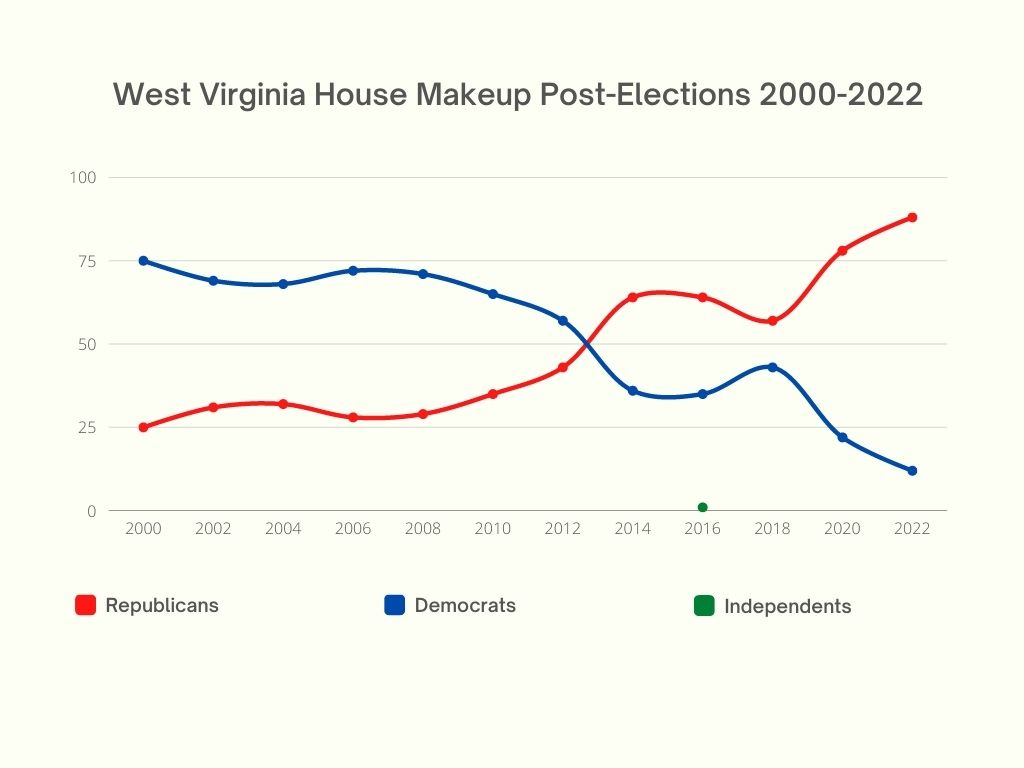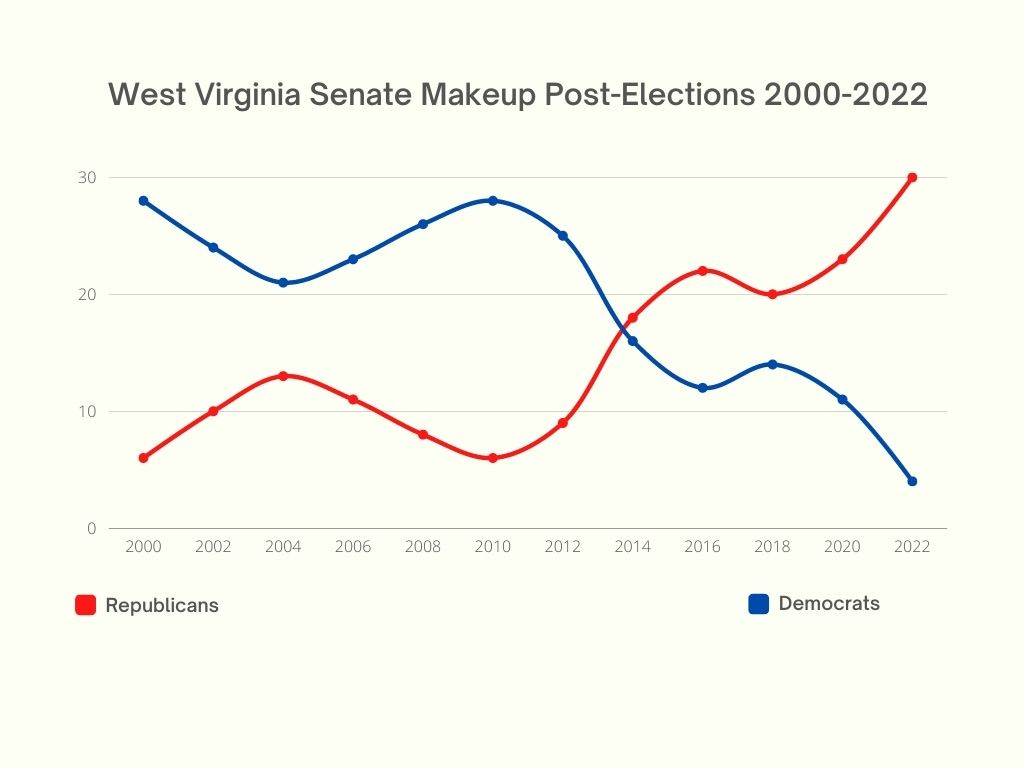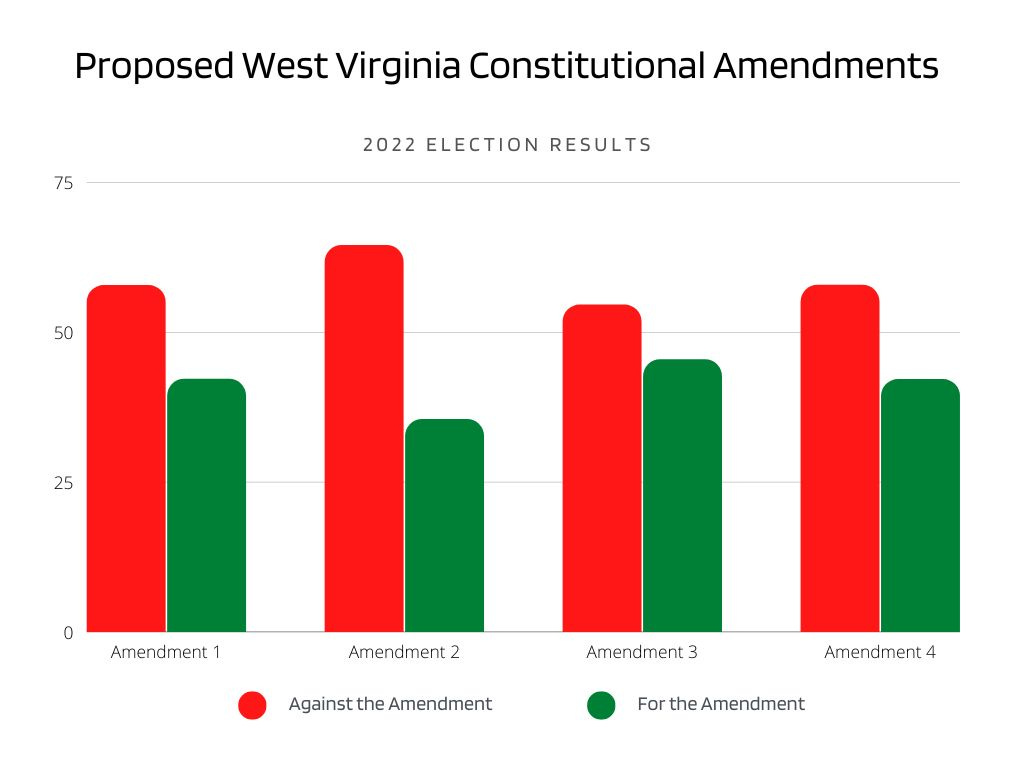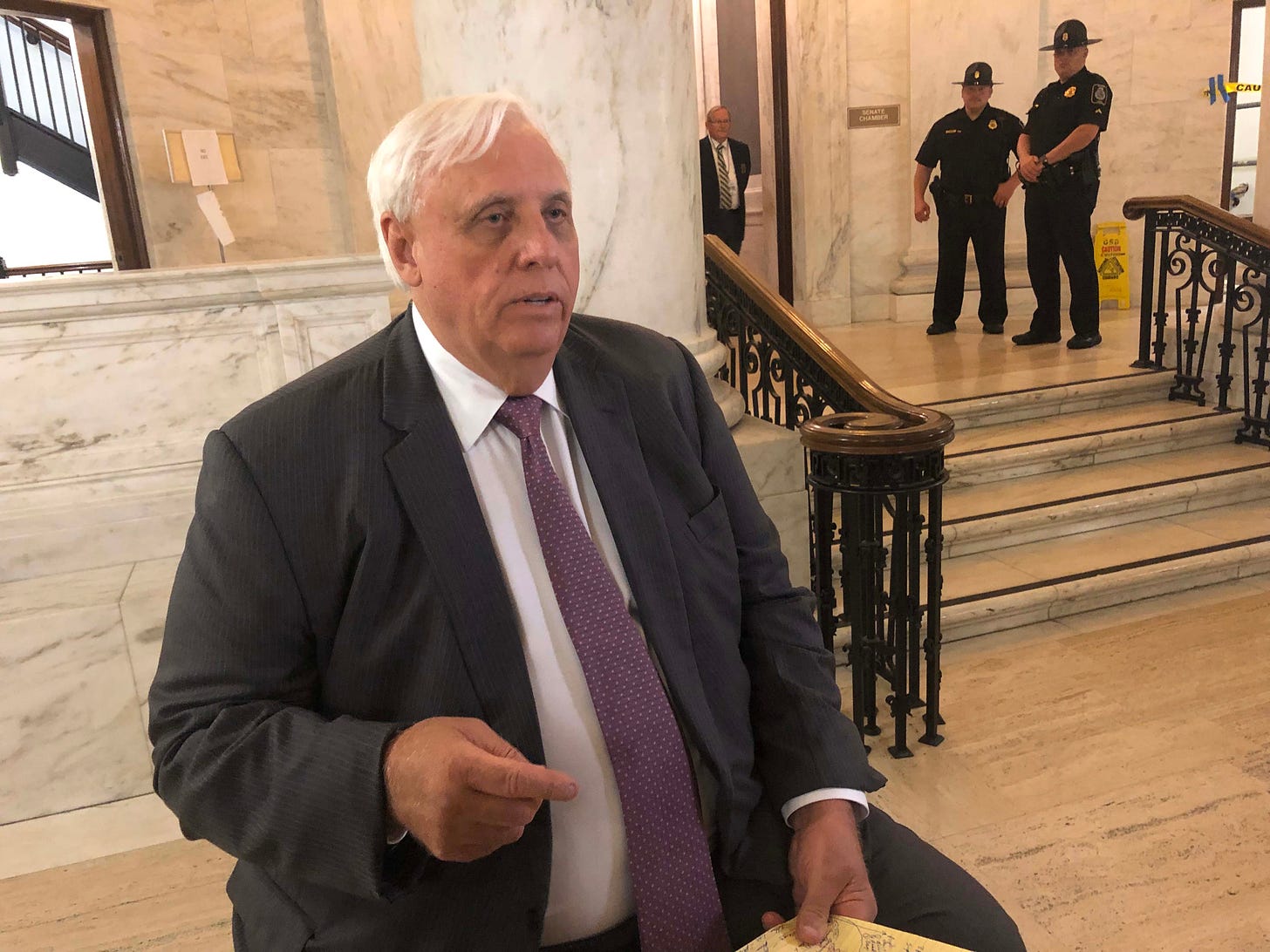Another red wave in West Virginia, but GOP-backed constitutional amendments failed.
A look back at the 2022 midterm elections and what it might mean for the upcoming session.
Considering the session is still more than a month away and there are no daily updates to be had quite yet, we figured it might be appropriate to take a look back at some recent news (notably, the midterm elections) and use that as a bit of a springboard to look ahead. So, here goes:
Republicans had already dominated the West Virginia Legislature, but come next session, their advantage will become even more pronounced.
Following the 2022 midterms, the GOP will hold 88 of 100 seats in the House of Delegates and 31 of 34 seats in the state Senate (Republicans had 30 coming right out of the election, but picked up another seat when a Democrat flipped parties. More on that later).
Republicans already held supermajorities following the 2020 election — holding 78 seats in the House and 23 in the Senate over the past two legislative sessions.
But this go around (following the every-ten-year redistricting process) saw recognizable names in the Democratic Party — namely in state Senate races — lose.
That includes Minority Leader Stephen Baldwin (Greenbrier) and Sen. Richard Lindsay (Kanawha). Also, longtime Sen. Ron Stollings (Boone) was knocked out out of his seat by Mike Stuart, who ran Donald Trump’s state-level campaign in 2016 and was then U.S. Attorney in the southern part of the state while Trump was president.
Longtime delegate Barbara Fleischauer Evans (Monongalia) also lost her bid to represent a district that had long been in the hands of Democrats, but will now belong to one-time-Democrat-now-Republican Mike Oliverio.
West Virginia Voters Down Constitutional Amendments
While the GOP has continued to strengthen its grasp on the statehouse since 2014, one thing is curious about this past election: All four constitutional amendments on the ballot this November (sponsored and backed by Republicans over the past two regular sessions) failed.
Amending the state’s constitution is no small feat. A joint resolution calling for changes or additions to West Virginia’s foundational text requires a two-thirds majority in both the House and Senate and, then, more than half of the general public voting in favor.
In recent years, Republicans had already held supermajorities in both chambers — and some Democrats voted in favor of some of these joint resolutions. So, getting these proposals on the ballot and in front of voters was fairly simple for the ruling party.
Just for reference, here are the joint resolutions that brought those questions to everyday West Virginians to decide:
Amendment 1: “Clarification of the judiciary’s role in impeachment proceedings” (HJR 2, Adopted in 2021)
Amendment 2: “Property Tax Modernization” (HJR 3, Adopted in 2021)
Amendment 3: “Incorporation of Churches or Religious Denominations” (SJR 4, Adopted 2021)
Amendment 4: “Education Accountability Amendment” (HJR 102, Adopted 2022)
But in the end, a majority of citizens said “no” to all four questions.
(There’s little need to get too deep into the specifics of each of these failed proposals quite yet, as each issue comes with a lot of history and plenty of arguments from either side. Also, it’s not a stretch to believe lawmakers will revisit some of these items, at least tangentially, this coming session. So, let’s just say we’ll save that for when the time comes.)
Giving the Legislature power over property taxes: A perennial issue for the GOP that’s yet to be realized
That said, there was one proposed amendment that stuck out more than the others.
If you were paying attention in the lead-up to the election, you probably noticed Gov. Jim Justice — despite being of the same party of those who backed the amendments — rallied against Republican lawmakers’ call to reform personal property taxes.
Republicans in the Legislature have argued for years that giving them the power to make changes to (meaning, reduce or eliminate) property taxes would make the state more business friendly. Those opposed to this idea have pointed out that counties could — and likely would — lose significant revenue that funds schools and other local programs.
I saw at least one post-election tweet (if it’s you, tell me, and I’ll happily edit this post and cite you) that said something to the effect of: “West Virginians will vote for Republicans, but don’t like their policies.”
I feel like a better way of putting it would be: “West Virginians want Republicans to be in power in Charleston and call the shots, but don’t want to open the door to allow for certain monumental changes. Also, even if the potential elimination of personal property taxes was perennially controversial to begin with, Republican Gov. Justice bucked those in charge within his own party upstairs from his office and helped kill its chances.”
What more GOP dominance and failed amendments might mean for the upcoming session
One might think these super-duper majorities in the West Virginia House and Senate would make it easy for any GOP priorities to breeze through the legislative process over the next two years — with virtually any bill introduced (and, potentially, any joint resolutions) being a sure bet based on simple math.
But the larger the supermajority, there’s more of a chance of factions splitting off within the party. Which could mean, leadership might need to do some corralling to accomplish their goals.
And these failed constitutional amendments would almost have to complicate the agenda current leaders in the GOP had likely hoped to tackle. For a couple of reasons:
Would it be politically wise to pursue these ideas after years of failed attempts and, most importantly, after voters said no?
Any bill passed and signed by the governor (if he’s even willing) would effectively remain moot until a constitutional amendment were ratified by voters to allow it to take effect.
In theory, lawmakers could still move forward on legislation that would address property taxes and the other failed amendments. But, any challenge in court would almost certainly lead to those laws being deemed unconstitutional — rendering them useless.
Gov. Justice has floated the idea of eliminating taxes on vehicles via a refund program, but it seems questionable given the Legislature’s prerogative. It is fair to say, though, that there will almost certainly be some maneuvering around this issue come January. But exactly what comes of it remains to be seen.
Speaking of the governor and political maneuvering…
Since Election Day (and even before), Gov. Justice has continued to tease a run for national office — more than likely the seat currently held by the lone Democrat elected to statewide office, Sen. Joe Manchin.
It’s one of many notable campaign announcements (or campaign teases, I should say) that will no doubt lead to a musical chairs in state politics come 2024. With that in mind, here’s a quick rundown of what we know now that a new election cycle — and other political jockeying — is already taking place:
Rep. Alex Mooney announced a bid for Sen. Manchin’s seat exactly one week after being elected to the newly reformed 2nd Congressional District.
State Treasurer Riley Moore, a grandson of former Gov. Arch Moore, announced a run for the seat currently held by Mooney.
Del. Moore Capito (Kanawha), the chair of House Judiciary, the son of Sen. Shelley Moore Capito and also a grandson of former Gov. Moore, has announced a run for governor.
While a withdraw (and not a position directly elected by the people), Sen. Patricia Rucker (Jefferson) announced she won’t seek to run the show in the Senate. Prior to the 2022 midterms, Rucker said she would challenge Senate President Craig Blair (Berkeley).
And Sen. Glenn Jeffries (Putnam) announced Thursday he has switched parties from Democrat to Republican. Jeffries, a contractor who is also a member of the Carpenters Union, wasn’t up for re-election this year — but will be in 2024.
That’s already lot of maneuvering.
And now that our heads have stopped spinning (or, maybe just started — it's difficult to tell), we’ll be back next week with a recap of any news that comes and start delving more into what to expect once the session rolls around.








T here was a town hall in Hampshire County Friday evening, headed by Sens Charles Trump and Craig Blair, and delegates elect Hillenbrand and Darren Thorne. Republicans all. a lot of Democrats showed up, from Morgan County as well as Hampshire. Probably more than the legislators bargained for. Some lively and heated discussion ensued. Unfortunately, can't cover too much in just an hour.
signed, Gramma Windy. And thanks for making this site available to us, we will keep track.
A main reason that I voted against the ballot amendments was the knowledge that once they became a part of the constitution, they would be very hard to undo. I was especially against #4. I really didn't care about #3.
signed, Gramma Windy